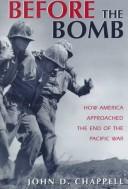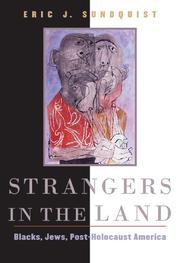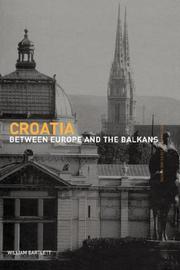| Listing 1 - 10 of 39 | << page >> |
Sort by
|
Book
Year: 2017 Publisher: [Place of publication not identified] : Great Neck Publishing,
Abstract | Keywords | Export | Availability | Bookmark
 Loading...
Loading...Choose an application
- Reference Manager
- EndNote
- RefWorks (Direct export to RefWorks)

ISBN: 0813158621 0813170524 9780813170527 0813119871 9780813119878 9780813158624 Year: 1997 Publisher: Lexington, Ky. University Press of Kentucky
Abstract | Keywords | Export | Availability | Bookmark
 Loading...
Loading...Choose an application
- Reference Manager
- EndNote
- RefWorks (Direct export to RefWorks)
Almost forgotten in the haze of events following Nagasaki and Hiroshima, the summer of 1945 witnessed an intense public debate over how best to end the war against Japan. Weary of fighting, the American people were determined to defeat the imperial power that had so viciously attacked them in December 1941, but they were uncertain of the best means to accomplish this goal. Certain of victory - the "inevitable triumph" promised by Franklin Roosevelt immediately after Pearl Harbor - Americans became increasingly concerned about the human cost of defeating Japan. Particularly after the brutal Iwo Jima and Okinawa campaigns, syndicated columnists, newspaper editorialists, radio commentators, and others questioned the necessity of invasion. A lengthy naval and aerial siege would have saved lives but might have protracted the war beyond the public's patience. Advertisers filled the media with visions of postwar affluence even as the government was exhorting its citizens to remain dedicated to the war effort. There was heated discussion as well about the morality of firebombing Japanese cities and of using poison gas and other agents of chemical warfare. Chappell provides a balanced assessment of all these debates, grounding his observations in a wealth of primary sources. He also discusses the role of racism, the demand for unconditional surrender, and the government's reaction to public opinion in the decision to drop the atomic bomb. Compelling and controversial, this is the first work to examine the confusing and contradictory climate of the American home front in the months leading up to V-J Day.
Book
ISBN: 9781442660533 1442660538 9781442694552 1442694556 9781442613300 1442613300 9781442645172 1442645172 Year: 2013 Publisher: Toronto
Abstract | Keywords | Export | Availability | Bookmark
 Loading...
Loading...Choose an application
- Reference Manager
- EndNote
- RefWorks (Direct export to RefWorks)
"In the spring of 1941, when Slovenia was invaded by Germany, Italy, and Hungary, Slovenes faced at best assimilation, and at worst deportation or extermination. Still, a significant number of Slovenes would eventually collaborate with the Axis powers. Why were they so ready to work with their invaders, and why did the occupiers permit this collaboration? Gregor Joseph Kranjc investigates these questions in To Walk with the Devil, the first English-language book-length account of Slovene-Axis collaboration during the Second World War. Examining archival material and post-war scholarly and popular literature, Kranjc describes the often sharp divide between Communist-era interpretations of collaboration and those of their emigre anti-Communist opponents. Kranjc situates this divide in the vicious civil war that engulfed Slovenia during its occupation - a conflict that witnessed at its bloody climax the execution of over 10,000 Slovene collaborators and opponents of the new Communist Yugoslav regime in the wake of liberation. To Walk with the Devil makes clear how these grisly events continue to ripple through Slovene society today."--Publisher's website.
History --- Collaborationists. --- General --- Axis occupation of Slovenia (1941-1945). --- 1941-1945. --- Slovenia --- Slovénie --- Slovenia. --- Collaborationists --- Histoire --- Collaborateurs --- HISTORY / Europe / Eastern. --- Eslovènia --- L.R.S. (Ljudska republika Slovenija) --- Ljudska republika Slovenija --- LRS (Ljudska republika Slovenija) --- People's Republic of Slovenia --- Republic of Slovenia --- Republika Slovenija --- S.R.S. (Socijalistička Republika Slovenija) --- S.R. Slovenija --- Slovenii︠a︡ --- Slovenija --- Slowenien --- Socialist Republic of Slovenia --- Socialistična republika Slovenija --- Socijalistička Republika Slovenija --- SR Slovenija --- SRS (Socijalistička Republika Slovenija) --- Szlovénia --- Axis occupation of Slovenia (1941-1945) --- 1941 - 1945
Book
ISBN: 1476612900 Year: 2014 Publisher: Jefferson, North Carolina : McFarland & Company, Inc., Publishers,
Abstract | Keywords | Export | Availability | Bookmark
 Loading...
Loading...Choose an application
- Reference Manager
- EndNote
- RefWorks (Direct export to RefWorks)
"Here is an overview of America's first effort in military aid to a foreign sovereign nation at a time when Europe was engaged in open warfare and Asia was undergoing a series of military confrontations"--
Lend-lease operations (1941-1945) --- International cooperation --- Military assistance, American --- World War, 1939-1945 --- History --- Diplomatic history. --- United States. --- History. --- United States --- China --- Relations
Book
ISBN: 1282505416 9786612505416 0739160540 9780739160541 9780739160541 9780739145630 9780739107362 Year: 2010 Publisher: Lanham, Md. Lexington Books
Abstract | Keywords | Export | Availability | Bookmark
 Loading...
Loading...Choose an application
- Reference Manager
- EndNote
- RefWorks (Direct export to RefWorks)
Russia's Life-Saver brilliantly examines the diplomatic rationale for and results of the U.S. decision to grant over 12 billion in Lend-Lease aid to Soviet Russia during World War II. Author Albert L. Weeks wields many facts and statistics never before published in the U.S. Of particular interest is the statement by Soviet Army Marshal Georgy K. Zhukov that U.S. Lend-Lease aid was indispensable, despite Soviet propaganda that sought to minimize its importance.
Lend-lease operations (1941-1945). --- Soviet Union -- Foreign relations -- United States. --- Soviet Union -- Military relations -- United States. --- United States -- Foreign relations -- Soviet Union. --- United States -- Military relations -- Soviet Union. --- World War, 1939-1945 -- Equipment and supplies. --- Lend-lease operations (1941-1945) --- World War, 1939-1945 --- Equipment and supplies. --- United States --- Soviet Union --- Foreign relations --- Military relations
Book
ISBN: 142143072X 1421430711 142143105X Year: 2019 Publisher: Johns Hopkins University Press
Abstract | Keywords | Export | Availability | Bookmark
 Loading...
Loading...Choose an application
- Reference Manager
- EndNote
- RefWorks (Direct export to RefWorks)
Originally published in 1969. In The Most Unsordid Act, Warren Kimball provides a history of the Lend-Lease idea. The genesis and development of the Lend-Lease idea, although spanning less than two years, offers a subject of the broadest significance for major questions of democratic government and society. The story begins with the United States' growing recognition of the British monetary and gold shortage and ends with the passage of the Lend-Lease Act and the American commitment that it involved. Dr. Kimball's narrative—chronological, detailed, and dramatic—includes analyses of the domestic and international concerns on both sides of the Atlantic and of the roles of the leading protagonists: President F. D. Roosevelt and Treasury Secretary Morgenthau, as well as Stimson, Hull, Churchill, and key British representatives. He also examines the possibility that Lend-Lease was designed to benefit the American economy at Britain's expense. A central question animates Kimball's account: How could a president who recognized the ultimate threat of Nazi Germany, but shared his nation's desire to avoid war, find a way to help an ally? The portrait of Roosevelt that emerges is instructive in view of revisionist histories that present him as a Machiavellian figure disingenuously leading his country to war. Kimball sees him, rather, as an essentially domestic president whose experiences and interests evolved from national concerns—as a man unschooled in international affairs, eager to avoid confrontation with his congressional opposition, wary of the British penchant for power politics, given to procrastination when faced with difficult problems, and anxious to avoid full-scale war. Yet, the administration's legislative strategy and the debate over the Lend-Lease Act clearly demonstrated that the president, his closest advisers, and the Congress were aware that the legislation would inevitably mean war with Germany. Based on such sources as the diaries of Morgenthau, the State Department Archives, Foreign Economic Administration records, the Stimson papers, and interviews with participants, this study provides insights that raise central questions about the functioning of the American system of government.
Lend-lease operations (1941-1945) --- United States --- Politics and government --- Lease-lend operations --- World War, 1939-1945 --- Economic assistance --- Lend-lease operations --- Economic aspects --- Equipment and supplies --- Finance --- History of the Americas

ISBN: 9780674019423 0674019423 0674030699 0674044142 9780674030695 Year: 2005 Publisher: Cambridge, Mass. Belknap Press
Abstract | Keywords | Export | Availability | Bookmark
 Loading...
Loading...Choose an application
- Reference Manager
- EndNote
- RefWorks (Direct export to RefWorks)
The importance of blacks for Jews and Jews for blacks in conceiving of themselves as Americans, when both remained outsiders to the privileges of full citizenship, is a matter of voluminous but perplexing record. A monumental work of literary criticism and cultural history, Strangers in the Land draws upon politics, sociology, law, religion, and popular culture to illuminate a vital, highly conflicted interethnic partnership over the course of a century.
Non-fiction
---
Fiction
---
American literature
---
Sociology of literature
---
Thematology
---
anno 1900-1999
---
African Americans in literature
---
Afro-Americans in literature
---
Afro-Amerikanen in de literatuur
---
Afro-Américains dans la littérature
---
Amerikaanse zwarten in de literatuur
---
Black Americans in literature
---
Catastrophe [Jewish ] (1939-1945)
---
Choa
---
Destruction des Juifs (1941-1945)
---
Destruction of the Jews (1939-1945)
---
Endlösung der Judenfrage
---
Exode (Evénement biblique)
---
Exodus (Biblical event)
---
Exodus (Bijbelse gebeurtenis)
---
Exodus [The ]
---
Extermination [Jewish ] (1939-1945)
---
Extermination des Juifs (1941-1945)
---
Guerre mondiale (1939-1945) -- Shoah
---
Génocide des Juifs (1941-1945)
---
Génocide juif (1941-1945)
---
Holocaust [Jewish ] (1939-1945)
---
Holocaust [Joodse ] (1939-1945)
---
Holocaust [Nazi ]
---
Holocauste (1941-1945)
---
Holocauste juif (1939-1945)
---
Hurban (1939-1945)
---
Hurbn (1939-1945)
---
Jewish Catastrophe (1939-1945)
---
Jewish Holocaust (1939-1945)
---
Jews -- Nazi persecution
---
Jews in literature
---
Jews--Exodus
---
Joden in de literatuur
---
Joden--Uittocht
---
Juifs -- Extermination (1941-1945)
---
Juifs -- Génocide (1941-1945)
---
Juifs -- Holocauste (1941-1945)
---
Juifs -- Rafles (1941-1945)
---
Juifs -- Shoah (1941-1945)
---
Juifs dans la littérature
---
Juifs--Exode d'Egypte
---
Nazi Holocaust
---
Nazi persecution of Jews
---
Negroes in literature
---
Noirs américains dans la littérature
---
Question juive [Solution finale de la ]
---
Race relations in literature
---
Racism in literature
---
Racisme dans la littérature
---
Racisme in de literatuur
---
Rafles de juifs (1941-1945)
---
Rassenverhoudingen in de literatuur
---
Relations raciales dans la littérature
---
Sho'ah (1939-1945)
---
Shoah
---
Sionisme
---
Solution finale de la question juive
---
Uittocht (Bijbelse gebeurtenis)
---
Zionism
---
Zionisme
---
Zwarte Amerikanen in de literatuur
---
African Americans in literature.
---
African Americans
---
Exodus, The.
---
Holocaust, Jewish (1939-1945)
---
Jews in literature.
---
Race relations in literature.
---
Racism in literature.
---
Zionism.
---
Relations with Jews.
---
History and criticism.
---
Holocaust, Jewish (1939-1945).
---
Exodus, The
---
Catastrophe, Jewish (1939-1945)
---
Extermination, Jewish (1939-1945)
---
Holocaust, Nazi
---
Ḥurban (1939-1945)
---
Ḥurbn (1939-1945)
---
Jews
---
Shoʾah (1939-1945)
---
Genocide
---
World War, 1939-1945
---
Kindertransports (Rescue operations)
---
African American-Jewish relations
---
Jewish-African American relations
---
Negro-Jewish relations
---
Zionist movement
---
Jewish nationalism
---
Relations with Jews
---
History and criticism
---
Nazi persecution
---
Persecutions
---
Atrocities
---
Jewish resistance
---
Exodus
---
History
---
Relations with African Americans
---
Politics and government
---
Restoration
---
United States
---
Race relations
---
20th century
---
Kelley, William Melvin
---
Marshall, Paule
---
Malamud, Bernard
---
Holocaust, Nazi (Jewish Holocaust)
---
Nazi Holocaust (Jewish Holocaust)
---
Nazi persecution (1939-1945)
---
American literature.
---
Exode.
---
Holocauste, 1939-1945.
---
Juifs dans la littérature.
---
Literatur.
---
Littérature américaine
---
Noirs américains dans la littérature.
---
Noirs américains
---
Race relations.
---
Racisme dans la littérature.
---
Rassenbeziehung
Periodical
ISSN: 18490344 0353295X
Abstract | Keywords | Export | Availability | Bookmark
 Loading...
Loading...Choose an application
- Reference Manager
- EndNote
- RefWorks (Direct export to RefWorks)
Croatia --- Croatia. --- History --- Croazia --- Horvátország --- Hrvatska --- Khorvatii︠a︡ --- Kroatien --- Ḳroʼeṭyah --- Narodna Republika Hrvatska --- NR Hrvatska --- People's Republic of Croatia --- Repubblica di Croazia --- S.R.H. --- Socialist Republic of Croatia --- Socijalistička Republika Hrvatska --- SR Croatia --- SR Hrvatska --- SRH --- קרואטיה --- クロアチア --- Kuroachia --- クロアチア独立国 --- Kuroachia Dokuritsukoku --- Croatia (Republic : 1941-1945) --- Khorvatii͡ --- Republic
Book
ISBN: 0801466180 0801466199 9780801466199 9780801449390 0801449391 Year: 2012 Publisher: Ithaca, NY
Abstract | Keywords | Export | Availability | Bookmark
 Loading...
Loading...Choose an application
- Reference Manager
- EndNote
- RefWorks (Direct export to RefWorks)
General Douglas MacArthur's storied career is inextricably linked to Asia. His father, Arthur, served as Military Governor of the Philippines while Douglas was a student at West Point, and the younger MacArthur would serve several tours of duty in that country over the next four decades, becoming friends with several influential Filipinos, including the country's future president, Emanuel L. Quezon. In 1935, he became Quezon's military advisor, a post he held after retiring from the U.S. Army and at the time of Japan's invasion of 1941. As Supreme Commander for the Southwest Pacific, MacArthur led American forces throughout the Pacific War. He officially accepted Japan's surrender in 1945 and would later oversee the Allied occupation of Japan from 1945 to 1951. He then led the UN Command in the Korean War from 1950 to 1951, until he was dismissed from his post by President Truman.In MacArthur in Asia, the distinguished Japanese historian Hiroshi Masuda offers a new perspective on the American icon, focusing on his experiences in the Philippines, Japan, and Korea and highlighting the importance of the general's staff-the famous "Bataan Boys" who served alongside MacArthur throughout the Asian arc of his career-to both MacArthur's and the region's history. First published to wide acclaim in Japanese in 2009 and translated into English for the first time, this book uses a wide range of sources-American and Japanese, official records and oral histories-to present a complex view of MacArthur, one that illuminates his military decisions during the Pacific campaign and his administration of the Japanese Occupation.
World War, 1939-1945 --- Generals --- Campaigns --- MacArthur, Douglas, --- Japan --- History --- J2299.11 --- J3388 --- K9182 --- North America: Genealogy and biography of the United States --- Japan: History -- Gendai, modern -- Shōwa period -- World War II -- Pacific war (1941-1945) --- Korea: History -- Korean war (1950-1953) --- Mai-kʻo-a-sê, --- Maike'ase, --- Makartur, Duglas, --- Maegadŏ,

ISBN: 1134478917 1280070250 0203642570 0415406595 9780203642573 9780415274326 041527432X 041527432X 9781134478910 9781134478866 1134478860 9781134478903 1134478909 9780415406598 9781280070259 Year: 2003 Publisher: London New York Routledge
Abstract | Keywords | Export | Availability | Bookmark
 Loading...
Loading...Choose an application
- Reference Manager
- EndNote
- RefWorks (Direct export to RefWorks)
Croatia, Between Europe and the Balkans addresses the key developments in economics, politics, international relations and social policy in the state over the last decade. It places these developments in their historical context, and shows how current policy dilemmas are structured within the conflicting pressures which historically have pulled Croatia between a European, a Mediterranean and a Balkan orientation. In the new context of European integration however, Croatia may now find a new role in her pivotal position as a bridge between the unruly Balkans and an impatient Europe. This book will be of particular use for courses on Eastern Europe. Its thorough, up-to-date analysis will also be of interest to students and researchers in politics and international relations, but with a broader appeal to diplomats, policy makers, trade officials, the business community and consultants expanding their trading links with the region.
Croatia --- Narodna Republika Hrvatska --- Socijalistička Republika Hrvatska --- SRH --- Hrvatska --- S.R.H. --- Kroatien --- SR Hrvatska --- SR Croatia --- People's Republic of Croatia --- Croazia --- Socialist Republic of Croatia --- NR Hrvatska --- Khorvatii︠a︡ --- קרואטיה --- Ḳroʼeṭyah --- Horvátország --- Repubblica di Croazia --- クロアチア --- Kuroachia --- クロアチア独立国 --- Kuroachia Dokuritsukoku --- Croatia (Republic : 1941-1945) --- Social conditions. --- Politics and government
| Listing 1 - 10 of 39 | << page >> |
Sort by
|

 Search
Search Feedback
Feedback About UniCat
About UniCat  Help
Help News
News